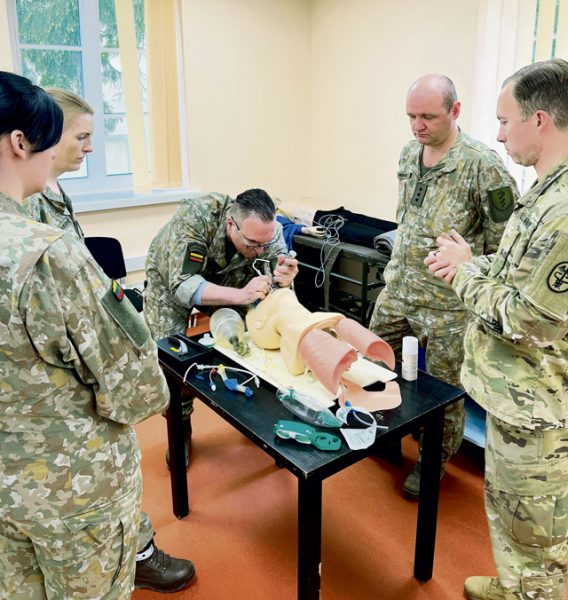
KAUNUS, Lithuania – A team of five medical experts from Landstuhl Regional Medical Center travelled to Kaunus, Lithuania recently where they spent a week discussing delayed evacuation casualty care with members of the Lithuanian Military Medicine Center of Excellence.
The overall purpose of the event was to support expanding the mission of providing definitive surgical trauma care in the Lithuanian footprint and strengthening partnerships with the Lithuanian Military Medical Service.
“This was a great opportunity for all involved,” said Lt. Col. (Dr.) Nathan Boyer, medical director of intensive care at Landstuhl Regional Medical Center. “It was a great feeling to dialogue with fellow medical providers on how to improve the care of patients, knowing that they may potentially be caring for me or someone on my team in the future.”
The weeklong engagement provided the Lithuanian military medical personnel, which consisted of doctors, nurses, and paramedics, with forty-hours of primarily classroom instruction, open dialogue, and roundtable discussions.
“The importance of these type of events cannot be overstated,” said U.S. Army Maj. Mitchell Hodges, chief nurse for Landstuhl Regional Medical Center Emergency Department. “The partnerships we formed help build mutual trust and shared understanding amongst the U.S. military and our allied and partner nations.”
According to medical officials, the dialogue and collaboration exposed Lithuanian medical personnel to delayed evacuation casualty care concepts that not only challenged their capabilities as individual medical professionals, but also provided them with relevant trauma medical scenarios and evidence-based practice.
“The event was a resounding success from all aspects,” added Hodges. “Not only did the Lithuanians learn how we conduct delayed evacuation care, but we also learned how they currently conduct delayed evacuation care and some of the challenges shared by both entities. Overall, this was a great experience and I believe we should continue these types of engagements in the future.”
In addition to focusing on delayed evacuation casualty care, the Lithuanian military medical students were also challenged on their critical thinking skills and ability to work together as a cohesive team.
“I think the most valuable parts of the discussions were the contrast in the care of patients in a resource limited setting versus the large fixed medical centers they currently work in,” said Boyer. “It is a real shift in mentality if you can only operate out of an aid bag, or a vehicle with limited medical supplies. This weeklong engagement highlighted the importance of teamwork and team dynamics, which they are already adept at.”
The recent medical training event in Lithuania was part of a larger Global Health Engagement (GHE) program being conducted between U.S. and allied and partner nations across the European footprint.


